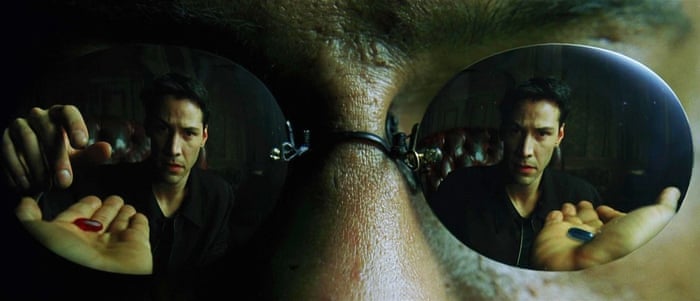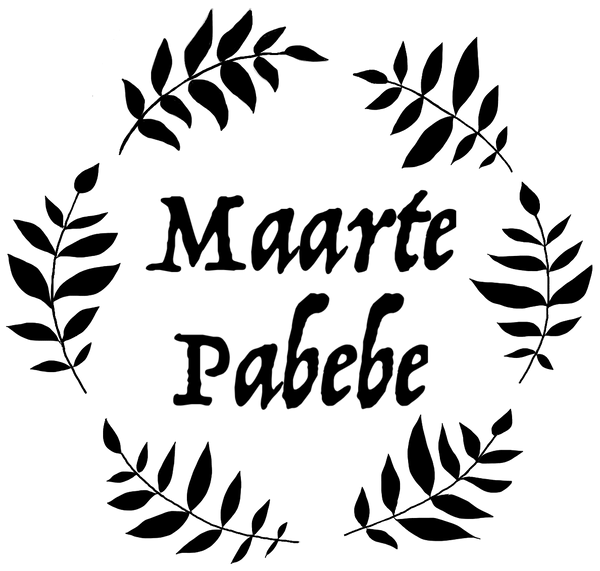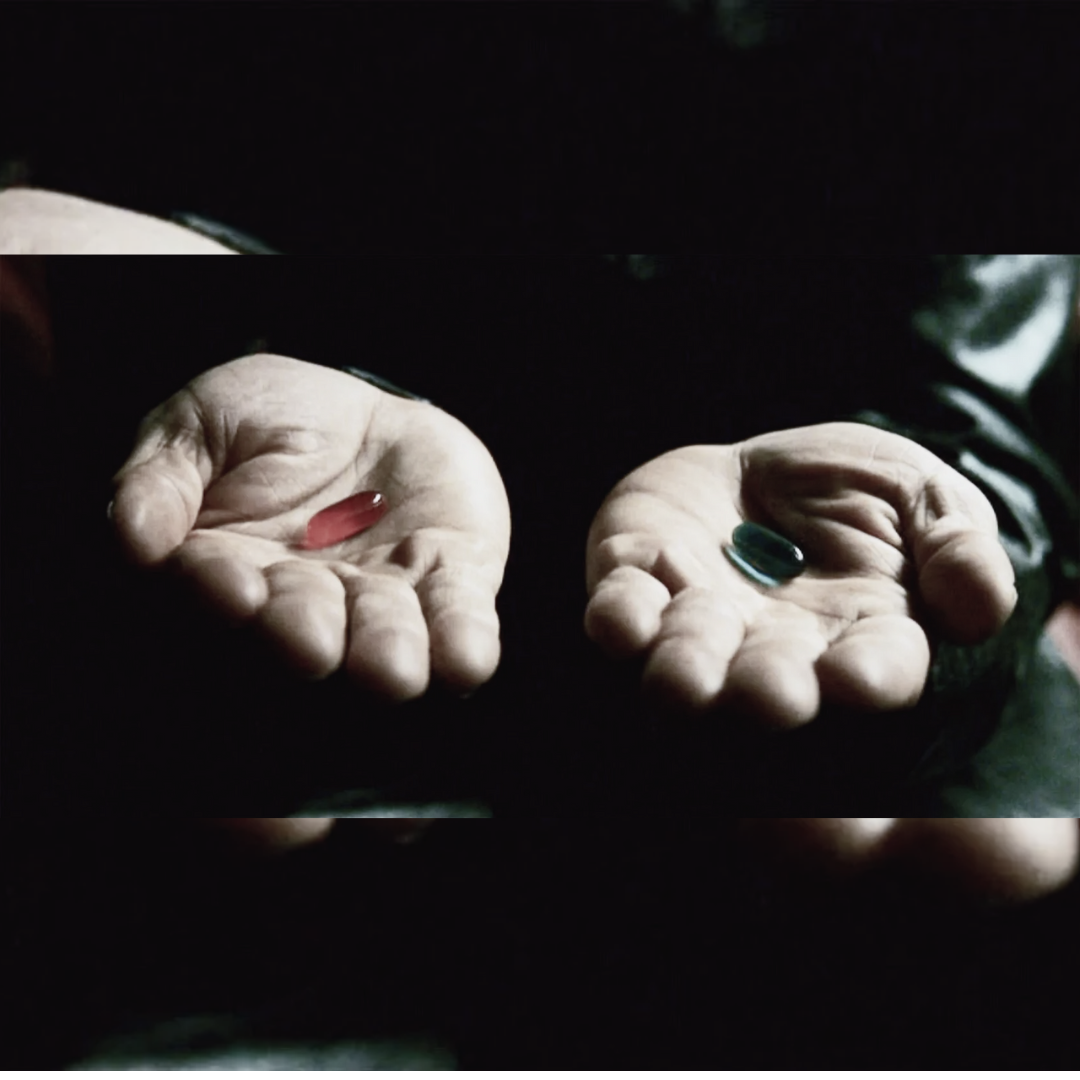Preface
This thought experiment is an existential piece that explores the benefits and disadvantages of knowing the ultimate truth of reality and the purpose of humanity, and the benefits and disadvantages of living a life not knowing these truths. In a broad sense, terms such as "truth" and "reality" refers to the answers of the existence of humanity, space and time, and not of the contemporary definitions that regard e.x. politics, environment, human history, current events, etc.
This article is inspired by the 1999 film, The Matrix.
Some Background
Matrix theory is a fascinating argument that combines philosophical and scientific doctrines. It can be traced to skepticism and in recent discussions of a post-human civilization(s) that could have simulated our environment. The theory argues that what we perceive as reality could merely be a simulation or computer-generated world.

Similar discussions can be seen by early rationalist thinkers such as Descartes (1596-1650), who examines whether our senses could be deceiving us and whether humanity is controlled by a deus deceptor. In addition, Putnam, a metaphysician, and his "Brain in a Vat" thought experiment (1981) also explores whether we can trust our perceptions or if we're deceived by illusion.
Similarly, the Simulation Hypothesis according to Nick Bostrom (2003) suggests that at least one of three propositions is true:
(1) The human species is very likely to go extinct before reaching a “post-human” stage;
(2) A post-human civilization is unlikely to have interest in running simulations of their evolutionary history;
(3) There is a high likelihood that we are living in a simulated reality.
That being said, can our senses be trusted? Is our environment merely just an illusion? If we are living in a simulated realty, would life be worth living? Would it matter?
Answering these questions would only bring more.
The Red Pill or the Blue Pill?
If you have never watched The Matrix (1999), there's a scene where Neo (the protagonist) was a given a choice: to take the red pill - a pill that would bring him to reality and break from the illusions of the Matrix - or, to take the blue pill - a pill that would allow him to continue living within the delusions of the Matrix.
I’ve been down this road before: knowing and not knowing; stressing over abilities that are out of my control, or being happily ignorant, knowing that my life is immediate. From following religion to being well informed of current events, there are forms of knowledge and truth that affect perception. The red pill represents truth in knowledge; and the blue pill represents bliss in ignorance.
This being said, is reality and truth worth pursuing if it costs ultimate happiness?

The Matrix (1999). Directed by The Wachowskis.
From time, humanity has followed certain rules and values that come with the society or culture they live in. The guidelines created provide a stability in routine, which ultimately leads to purpose. However, there are internal conflicts within those routines that may cause the agent to question their ability, to question their value in society and life in general. This concern causes stress, a crisis that affects how one continues to live their life. Choosing the red pill - knowing what the matrix is - is essentially the truth of existence. As animate beings, we only see the visible world - the world of vision, experience, change and uncertainty. Humans are naturally curious, consistently trying to find reason behind action and reason for existence. When it comes to these curiosities, doubts do arise when an individual deems it reasonable. Uncertainty of the unknown is what keeps humanity from expanding, but uncertainty also raises questions of purpose, of meaning to life. This fear of uncertainty can be confined in by religion: an attempt to explain and provide answer to questions that cannot be answered. According to Blaise Pascal, the want for meaning and purpose is satisfied by knowledge of god, knowledge of a higher being. Arguably, religion can also be deemed a form of ignorance, as a direct notion to not accept the possibility that there is nothing above that religion, to completely dismiss the ideas of others is - itself - ignorant.
The anxieties that come with the unknown are incredibly overwhelming, so why not choose the red pill? Will choosing truth ease the anxieties of the unknown? Why not choose truth?
Choosing the knowledge that comes with truth and reality exceeds contemporary life, it grasps concepts above human nature. Choosing the red pill means leaving humanity. However, if an individual were to remain human, there is a responsibility that comes with the truth. With truth comes answers, comes reason, and comes compensation. If an individual can carry the truth in its entirety while also witnessing a reality that experiences suffering, then the individual still looses their humanity. According to Peter Singer, humans grant moral consideration based on their ability to suffer. And as we know to be true, there is suffering experienced throughout all beings of contemporary life.
Now, to consider the blue pill.
The pill that conforms to everyday life and acts within the distractions of truth and reality. Choosing the blue pill can be seen as a means of ignoring ultimate knowledge and reality, and replacing “the truth” with a fantasy that distracts the agent. And I don't blame the person that would choose the blue pill, humanity wants to find coping mechanisms to relieve certain realities. Maybe, instead of seeing it as willfully choosing ignorance, not obtaining reality and truth can be a knowledge worth not knowing. Fear is a huge part of being human and fear is what holds one back from establishing truth and reality. There is an innate fear that ultimate reality exceeds what it is to be human.
Arguably, the blue pill does not necessarily mean ignorance, but in the agent finding a truth in their senses and concluding that contemporary life is the ultimate truth. That truth and reality is experienced in what is immediate. There is content in knowing that there is stability in routine, that a singular individual can be challenged with the “realities” that do come with contemporary life. Why does the desire to expand truth continue if not all of humanity can establish the same truth?

If I choose the blue pill, I could live a life that does not know of an ultimate reality; a life that would also be living a fear of the unknown. To some extent, the fear of the unknown can be so horrifying that one may loose all ability to move - to no longer see life as important because there is an unknown entity that is bigger than all of us. There is also a fear in knowing the truth in reality, in knowing that, as humans, all the information given would be too overwhelming for human minds. If an invidual does not truly deem reality and truth not worth pursuing, the chance of regret of what could have been can also be extremely overwhelming. With these fears, the agent chooses to live a life of suffering until their demise.
I, however, see the reality of living in ignorance, in ignoring the ultimate truth of the universe and the purpose of humanity, space, time, and reality. If I took the blue pill, instead of stressing over not knowing truth and reality, I would find content in not knowing. Who’s not to say that I do not wonder of truth, but rather conform into reasons that I know to be true. I would live a contemporary life that would include the notion of religion, a life that acknowledges the imbalances and sufferings of humanity at the hands of others and the individuals themselves, to live and act by certain values that promises a greater purpose. To enjoy contemporary life as it is, to enjoy the time being a human who interacts with the visible world. To live my life happy. Until the end of humanity, I believe that is the time that all truth and reality is revealed. When humanity sees truth, I will also see truth and reality. Until then, I can wait until truth can be revealed to me. Because moving from the visible world to the intelligible world (Plato), is to be human.
Recommended Media
The Matrix. (1999). Warner Bros.
Bostrom, Nick. “Are We Living in a Computer Simulation?” The Philosophical Quarterly, vol. 53, no. 211, Apr. 2003, pp. 243–255, www.simulation-argument.com/simulation.pdf, https://doi.org/10.1111/1467-9213.00309.
Descartes, R., & Clarke, D. M. (2010). Meditations. Penguin Books. (Original work published 1641)
Hudson, Paul. “Knowledge Is Power, Ignorance Is Bliss: Happiness Is Striking the Perfect Balance.” Elite Daily, 7 Feb. 2014, www.elitedaily.com/money/entrepreneurship/knowledge-is-power-ignorance-is-bliss-happiness-is-striking-the-perfect-balance.






